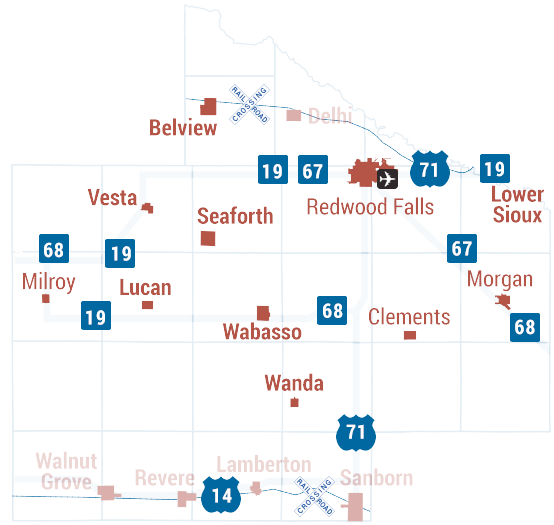Small towns reap business benefits of entrepreneurs, visionaries
Wednesday, September 30, 2015
WILLMAR — A small town in Illinois that expanded its infrastructure to the nearby interstate highway is earning six times the revenue of the sister city on the other side of the interstate that did not expand its infrastructure.
But the city is reaping the reward of those who had the entrepreneurial vision to take advantage of a situation and make things better in their community, said Craig Lindvahl, a former teacher, a filmmaker, author and executive director of the Midland Institute for Entrepreneurship in Illinois.
Lindvahl spoke Tuesday morning at the MinnWest Technology Campus auditorium in Willmar to 60 business and government leaders, along with 17 area high school students who are participating in an entrepreneurship program. The “Boomtown USA” discussion of community development was organized by the Willmar Lakes Area Vision 2040 collaborative effort.
Lindvahl discussed using local resources and engaging younger people in the business community. His discussion was based on two books: “Boomtown USA: The 7 1/2 Keys to Big Success in Small Towns,” by Jack Schultz, and “The Things You Wish You Knew Yesterday,” by Lindvahl.
In his own hometown of Effingham in south central, Illinois, Lindvahl said visionaries promoted the idea of constructing a lake, which was named Lake Sarah, because that area of the state is not blessed with many lakes like Minnesota.
The project was controversial and some of the “backward thinkers’’ didn’t think this was such a good idea, Lindvahl said.
“It was too much money, it was too much effort. But now it’s grown its own cottage industry around the lake. It’s made our town a very attractive town for new business, for people to retire in and move in,’’ he said.
Lindvahl talked about individuals who pursued a vision that eventually became a major business or led to business expansion in their towns.
In an interview, Lindvahl said it’s important to have buy-in from all major stakeholders, such as local government.
“However, there are times when you have to do disruptive things. You want a buy-in. But sometimes if it’s the right thing, you have to have the vision and the fortitude to just get it done,’’ he said.
“When you have the opportunity to think about your community in a new way, and not just think about ‘I wish this was better or I don’t like this,’ you get sort of immune and blind to the best things about your community sometimes,’’ Lindvahl said.
“Having somebody from the outside come in and just trigger those thoughts about, ‘Wait a minute: We’ve got this and we’ve got that. We’ve got this wonderful thing and that wonderful thing,’ we can leverage those things and maybe build industry or build business that we haven’t built before. We can appreciate who we are and really value what a great community we live in,’’ he said.
Besides discussing keys to small-town success, Lindvahl explained the entrepreneurship program he founded for students interested in business or starting their own businesses called Creating Entrepreneurial Opportunities.
A local CEO program includes students from Willmar, Atwater-Cosmos-Grove City, and New London-Spicer high schools.
The program is in its second year in the area. In CEO, students visit area businesses, talk with business executives and owners, and open their own businesses.
They close the school year with a trade show, at which they present their business ideas to the public. Many CEO students express an interest in starting businesses in their home areas.
Lindvahl said students learn to think and learn to view the world like entrepreneurs. He said entrepreneurship is not a collection of business skills and knowledge.
“It’s the way you think,’’ he said. “It’s the coolest thing I’ve ever heard of. It’s funded by investors. Schools don’t pay for CEO. Investors pay for CEO: a small monetary investment and a large personal investment.’’
Lindvahl said the class never meets in a school, but always meets in a business. Students prefer meeting with business people rather than in a classroom setting. Everything in CEO is real. There are no textbooks, no quizzes and no tests.
“They’re all going to start their own real, viable businesses,’’ he said.
Among the students in the audience were Martha Roberts, a senior at Willmar High School, and Anika Olson, a junior at New London-Spicer High School.
Roberts said she joined CEO because she had heard many good things about the program. She does not have an idea for a business, but wanted to learn more about business.
“A bunch of kids from Willmar did it last year and one of my close friends told me about it. She learned so much and loved the class,’’ said Roberts.
Olson said she heard about CEO from people at school.
“I love it. It’s an amazing experience,’’ she said.
Category: Entrepreneurship Education








.jpg)